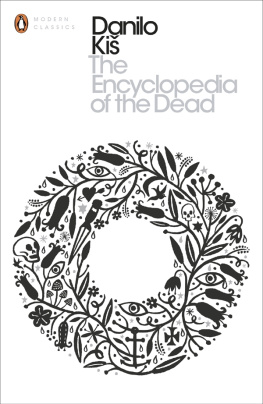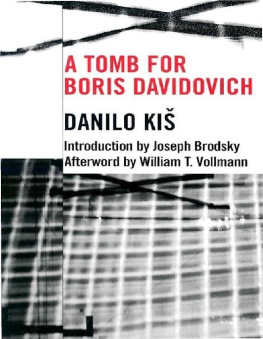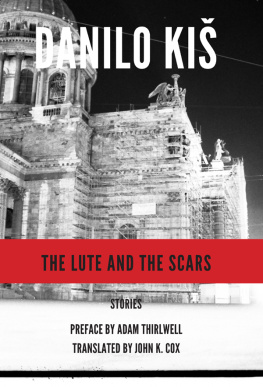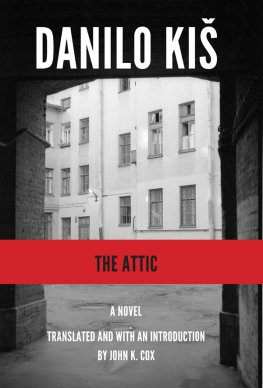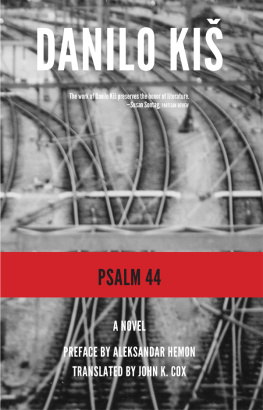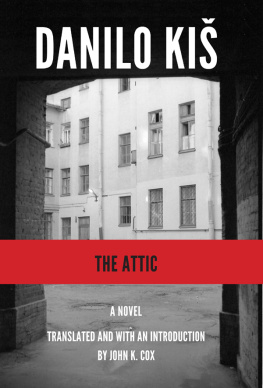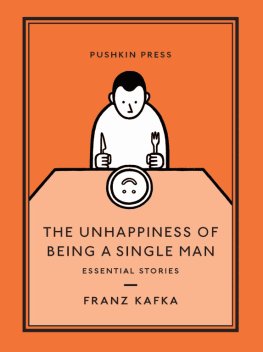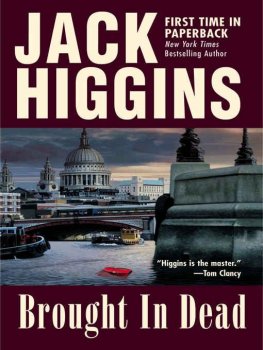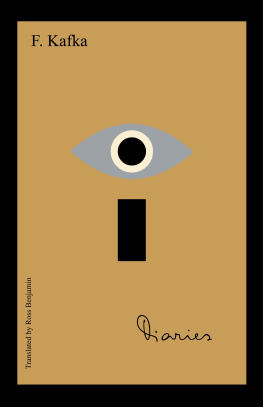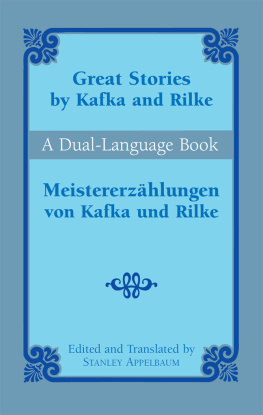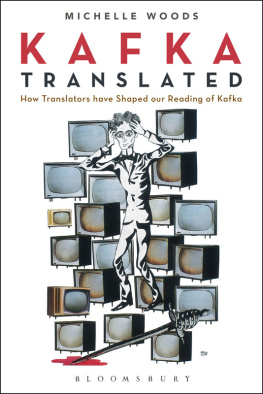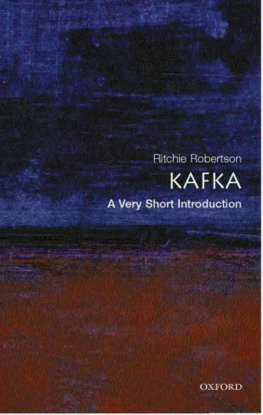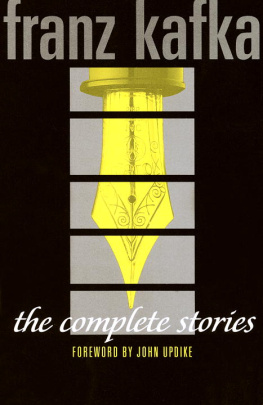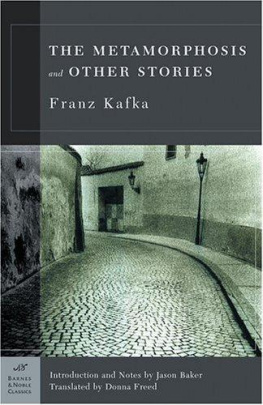Danilo Ki
THE ENCYCLOPEDIA OF THE DEAD
Translated by Michael Henry Heim
Revised and with an Introduction by Mark Thompson
PENGUIN MODERN CLASSICS
THE ENCYCLOPEDIA OF THE DEAD
DANILO KI (19351989) was born in Subotica, a town in northern Yugoslavia. His father Eduard was an assimilated Hungarian Jew by origin, who worked as a railway inspector. His mother Milica came from Montenegro, where she was raised in Eastern Orthodox Christianity. Danilo and his sister Danica (b. 1932) were baptized in the Orthodox Church as a defence against the anti-Semitic persecution that was spreading across central Europe. Eduard, having narrowly survived a pogrom against Serbs and Jews in 1942, took his wife and children to live in his native village in Hungary. They survived there in penury until 1944, when Germany occupied Hungary and 437,000 Jews were deported to Auschwitz, including Eduard with his siblings and cousins. Milica took her children home to Montenegro in 1947. After her death in 1950, Danilos uncle and aunt looked after him. Danilo went to university in Belgrade, becoming Yugoslavias first graduate in World Literature. Except for periods of employment as a lector at French universities, he remained in Belgrade until 1979, when he settled in Paris. Two short novels (The Garret and Psalm 44) were published in 1962. Garden, Ashes (1965) and Hourglass (1972) treat his and his familys experiences during the war. A Tomb for Boris Davidovich (1976) is a cycle of stories about revolution and violence. Its publication in English in 1978 brought a measure of international fame. His last book was a collection of stories, The Encyclopedia of the Dead (1983). Diagnosed with lung cancer in 1986, he died in Paris and is buried in Belgrade. He was married to Mirjana Mioinovi between 1962 and 1981; his partner in the last decade was Pascale Delpech. Comprising poems, plays and essays as well as fiction, his complete works run to ten volumes. At the latest count, his writing has been translated into 42 languages. More information is available at www.danilokis.org.
MARK THOMPSON was born in Sheffield and lives in Oxford. He has published two books about the end of Yugoslavia (A Paper House and Forging War). His history of Italy in the First World War (The White War, 2008) was awarded the Hessell-Tiltman Prize by English PEN and shortlisted for the Orwell Prize and the Duff Cooper Prize. His biography of Danilo Ki, Birth Certificate (2013), was a finalist in the category of biography for the National Book Critics Circle Award. He has translated fiction from French, Italian and Croatian. He was an information officer in the biggest peacekeeping mission deployed by the United Nations (UNPROFOR, with approx. 44,000 personnel), and the political officer in the smallest mission (UNMOP, with 28 personnel). He works in London for the Open Society Foundations, and teaches doctoral candidates in Oxford and Norwich.
Ma rage daimer donne sur la mort comme une fentre sur la cour.
GEORGES BATAILLE
Introduction: Danilo Ki and pocket-sized novels
Danilo Ki was a maker of fiction who distrusted fantasy, a dreamer obsessed with politics and historical truth. Standing over six feet tall, slim and blue-eyed under a mane of hair, with a smoky baritone voice raised in conversation or song, he cut a dramatic figure. His credo as an artist was, however, austere and even self-effacing. The work is everything; what it fails to communicate can hardly be discussed. In his lifetime, Ki came to personify liberal pluralist values that stuck in the throats of communists and nationalists alike. Since his death in 1989, his books have survived the wars that destroyed his country and even his language to find an audience around the world. The Encyclopedia of the Dead has been translated into twenty-five languages including Basque, Norwegian, Thai and, most recently, Korean.
Danilo Ki was born in 1935 at the northern edge of Yugoslavia, a multinational state established after the First World War as a unitary kingdom. His father Eduard was an assimilated Hungarian Jew by origin who worked as a railway inspector, while his mother Milica was an Orthodox Christian from Montenegro, beside the Adriatic Sea. As the offspring of this union, Ki called himself an ethnographic rarity.
At the end of 1938, with anti-Semitism looming across central Europe, Danilos parents took the wise precaution of baptizing him and his sister Danica in the Serbian Orthodox Church. In spring 1941, war brought Hungarian fascist occupation of the northern territory. Early in 1942 the occupiers carried out a pogrom in Novi Sad, where the Ki family lived. Eduard was taken away but the children were spared. By fluke, Eduard was released; he then decided the family would be safer in his native village in south-western Hungary. There they scraped by until German forces overran Hungary in 1944. Eduard was deported to Auschwitz alongside his relatives. Milica and her children remained in the village, waiting, but this time Eduard did not return. In 1947 Milicas brother traced the survivors and took them back to Yugoslavia, which had been remade as a communist federation that possessed as the quip went seven frontiers, six republics, five nationalities, four languages, three religions, two alphabets and one dictator: Josip Broz Tito. It was Europes most diverse country.
Danilo learned his native tongue again as a schoolboy in Montenegro. By the time he went to university in Belgrade in 1954, his mother had died and his sister had married and moved away. Writing became his mainstay, a realm where he could turn loss into literature, mastering through narrative the brutal collisions that had blighted his childhood. His first books of note, Garden, Ashes (1965) and Hourglass (1972), transposed his childhood experiences into fiction. History in Kis writing has something like the status that Nature had for painters in earlier centuries. It is the element where fiction encounters the real world, the guarantor of proportion and value. History offers the stability of truth as well as the infinity of approaches to that truth. It is the juggernaut that killed his father, but it is also the history of literature itself a living record and resource.
History limits the interest that mere imagination can arouse. Angela Carter noted this when she reviewed the book in 1989: Truth is always stranger than fiction, because the human imagination is finite while the world is not. This is why Kis idea of literary perfection was a work that, after the first time round, can be read like an encyclopedia. A work so charged with knowledge, so accessible yet seductively structured that its riches yield themselves little by little. (Joyces Ulysses was the gold standard, a great novel that was also a great manual of technique.) Fiction has to reckon with history, not shun or flatter it. This elusive middle way opens only to mastery of form. Ki loved the mise en abyme, fiction that draws reflexively on literature to create vertiginous effects: stories within stories, where reading, writing and interpretation are intrinsic to the plot. The two best examples in this book are The Encyclopedia of the Dead and Red Stamps with Lenins Head, which happened to be Kis favourites.
After Hourglass, Ki turned to the crimes of Stalinism and the delusions of its foreign supporters. A Tomb for Boris Davidovich

